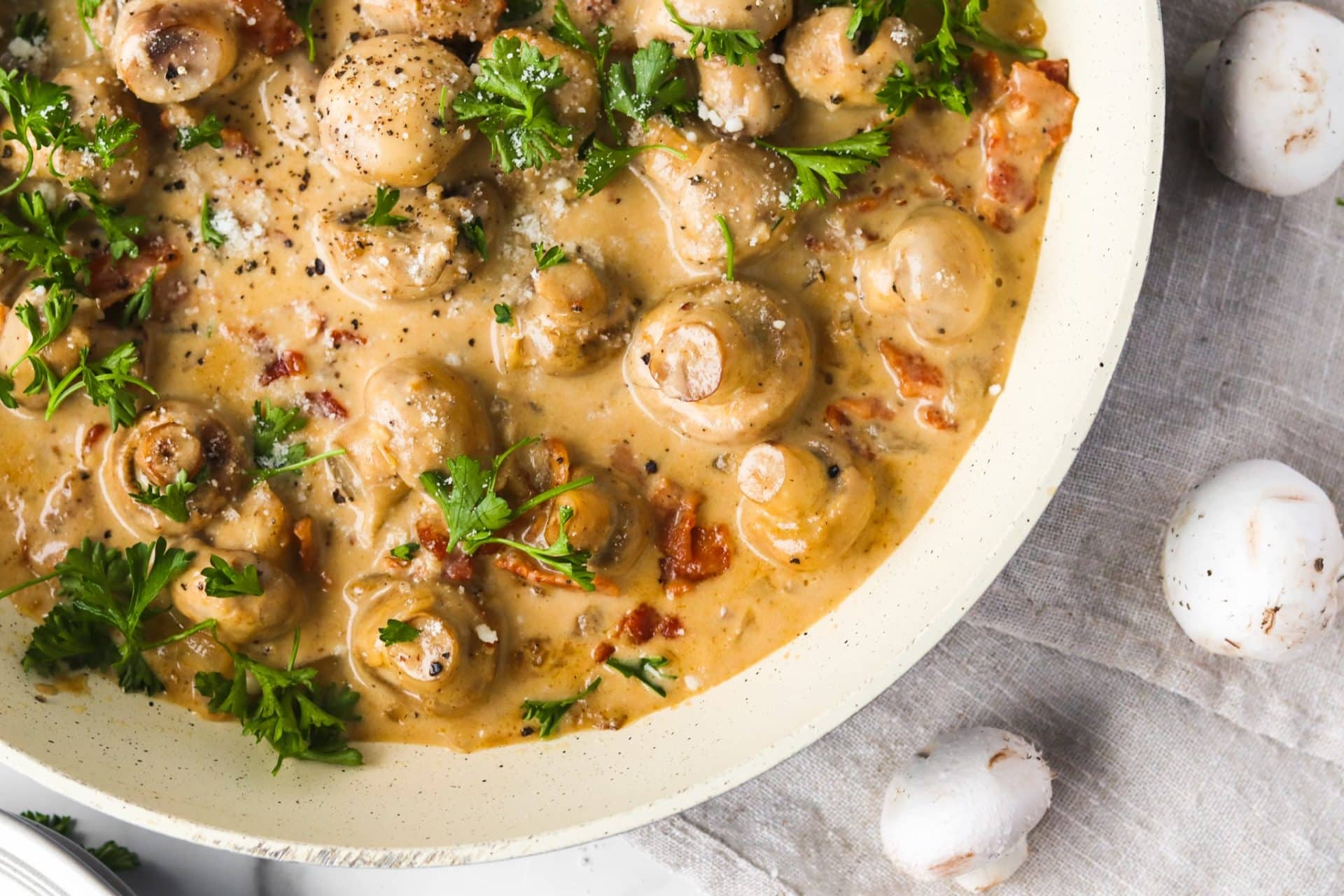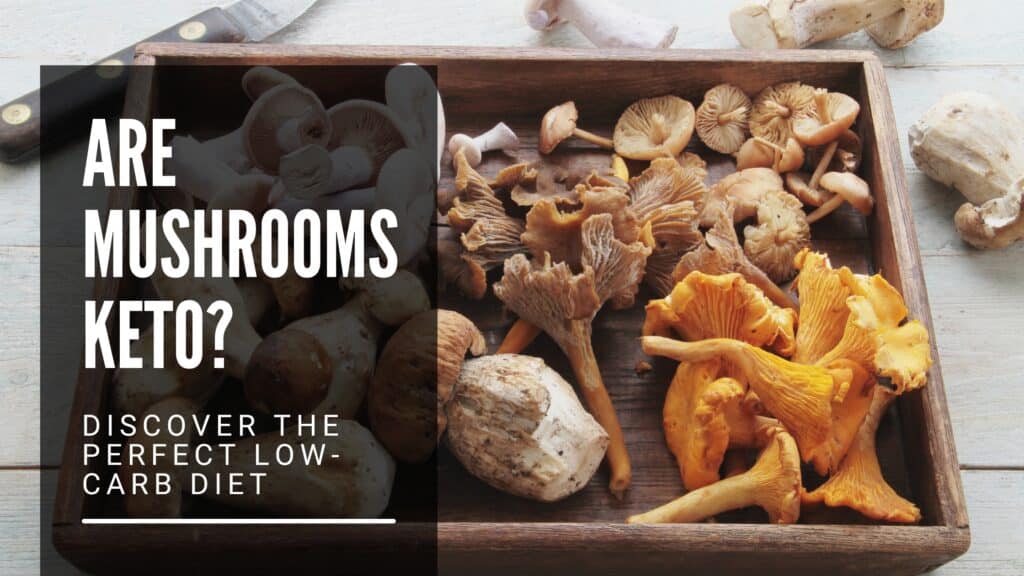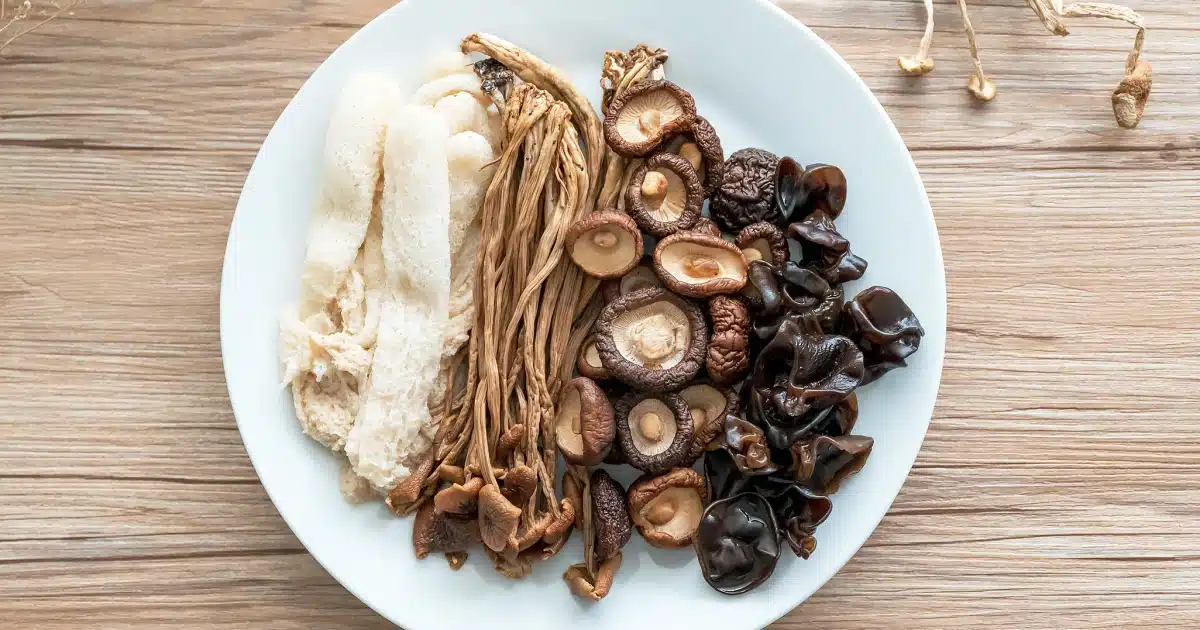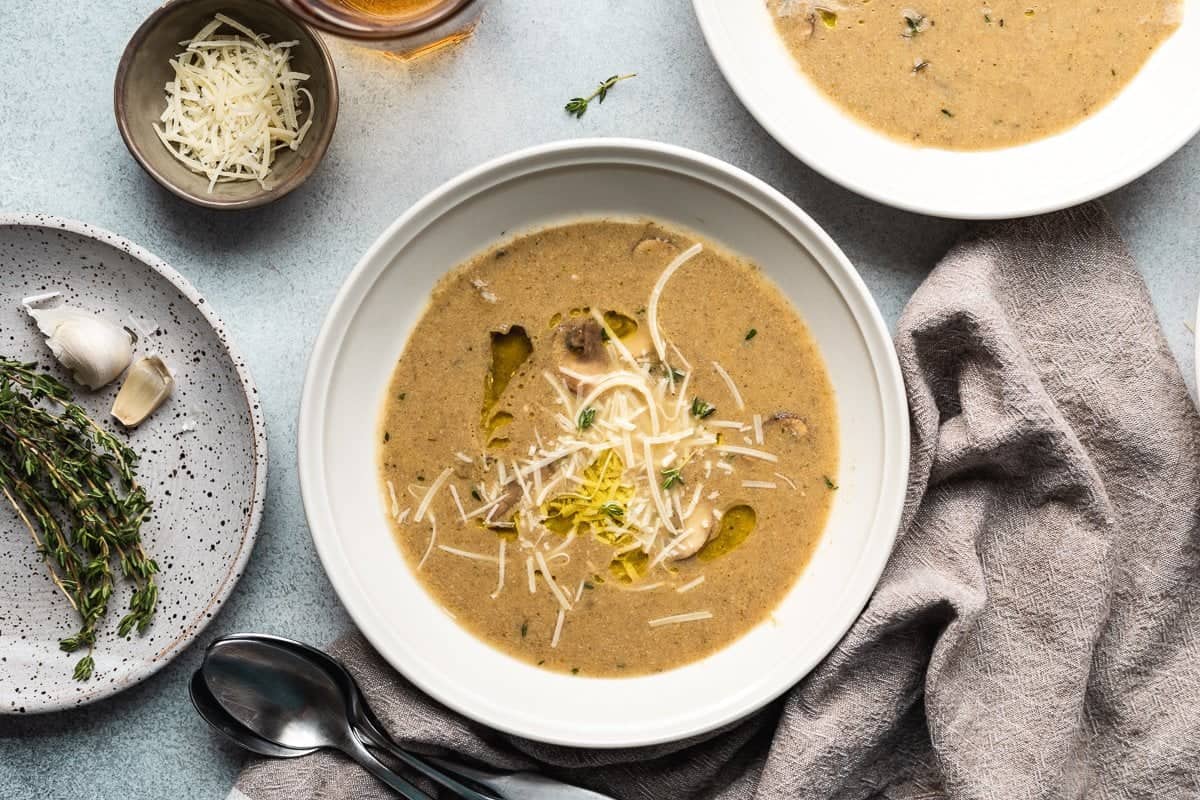The keto diet has become incredibly popular for its ability to promote weight loss and improve overall health by focusing on low-carb, high-fat foods. One of the key challenges is finding foods that are both delicious and low in carbs. This is where mushrooms come in. With their low carbohydrate content and rich nutritional profile, mushrooms are an ideal addition to any keto diet.
Not only do mushrooms fit perfectly within the strict carb limits of keto, but they also bring a wealth of health benefits to the table. Whether you’re a seasoned keto veteran or just starting out, incorporating mushrooms into your diet can make your meals more enjoyable and nutritious. Let’s explore why mushrooms are a perfect fit for your low-carb lifestyle.
Quick Summary
- Low in Carbs: Mushrooms are low in carbohydrates, making them suitable for a keto diet.
- High in Fiber: They help with digestion and satiety due to their fiber content.
- Rich in Nutrients: Mushrooms contain essential vitamins and minerals beneficial for overall health.
- Health Benefits: They support digestion, immune function, and weight loss.
- Versatile in Recipes: Mushrooms can be easily incorporated into various keto-friendly dishes.
Nutritional Profile of Mushrooms
Mushrooms are not just low in carbs, but they’re also packed with a variety of nutrients that make them a powerhouse of health benefits. Here’s a deeper look into what makes mushrooms so special for a keto diet:
Carbohydrates
One of the standout features of mushrooms is their incredibly low carbohydrate content. For those on a keto diet, where keeping carbs to a minimum is essential, mushrooms fit the bill perfectly. Most mushrooms contain only 2-3 grams of carbs per 100 grams, which is significantly lower than many other vegetables. This makes them an ideal choice for maintaining ketosis while enjoying a diverse and tasty diet.
Proteins
While mushrooms aren’t a significant source of protein compared to meat or legumes, they still offer a respectable amount. With around 3-4 grams of protein per 100 grams, mushrooms can contribute to your daily protein intake, which is important for muscle maintenance and overall health.
Fats
Mushrooms contain negligible fat, but this can be a good thing on a keto diet where you might be getting your fats from other sources like avocados, nuts, and oils. The low-fat content of mushrooms means they can easily be paired with high-fat ingredients to create a balanced meal that aligns with keto principles.
Vitamins and Minerals
Mushrooms are a treasure trove of essential vitamins and minerals. Here’s a closer look at some of the key nutrients found in mushrooms:
-
B Vitamins: Mushrooms are rich in several B vitamins, including B2 (riboflavin), B3 (niacin), and B5 (pantothenic acid). These vitamins play a crucial role in energy production and maintaining brain health.
-
Selenium: This important mineral acts as an antioxidant, protecting your cells from damage and boosting your immune system.
-
Potassium: Essential for heart health and proper muscle function, potassium also helps balance fluids in your body.
-
Vitamin D: Some mushrooms, like shiitake and portobello, can provide a good amount of vitamin D, especially if they have been exposed to sunlight during growth. Vitamin D is vital for bone health and immune function.
Three Reasons Mushrooms Are Perfect for Keto
Mushrooms are a fantastic addition to any keto diet, and here’s a detailed look at why they are such a perfect fit:
Low in Carbs
One of the primary reasons mushrooms are ideal for a keto diet is their remarkably low carbohydrate content. On a keto diet, keeping carb intake to a minimum is crucial to maintaining ketosis, a metabolic state where the body burns fat for fuel instead of carbohydrates.
How Low Are We Talking?
Most types of mushrooms contain just 2-3 grams of carbs per 100 grams, making them one of the lowest-carb vegetables available. This is significantly less than many other vegetables. For instance, a similar serving of broccoli contains around 6 grams of carbs, carrots about 10 grams, and potatoes a whopping 17 grams.
Here’s a quick comparison table for context:
|
Vegetable |
Carbs (per 100g) |
|
Mushrooms |
2-3g |
|
Broccoli |
6g |
|
Carrots |
10g |
|
Potatoes |
17g |
With such a low carbohydrate count, mushrooms can be enjoyed freely without worrying about exceeding daily carb limits. This allows for greater flexibility in meal planning and helps in diversifying the diet, which can sometimes feel restrictive on keto.
High in Fiber
Fiber plays an essential role in a healthy diet, and it’s particularly important on keto. While a keto diet is low in carbs, getting enough fiber can sometimes be a challenge since many high-fiber foods are also high in carbs. This is where mushrooms come in.
Why Fiber Matters:
-
Digestive Health: Fiber aids in maintaining a healthy digestive system by promoting regular bowel movements and preventing constipation.
-
Satiety: Foods high in fiber help you feel full longer, which can prevent overeating and aid in weight management—a common goal for many on a keto diet.
-
Blood Sugar Control: Fiber helps slow the absorption of sugar into the bloodstream, which is beneficial for maintaining stable blood sugar levels.
Types of Mushrooms with High Fiber:
Different types of mushrooms offer varying levels of fiber. For instance, shiitake and portobello mushrooms are known for their higher fiber content, making them excellent choices for those looking to boost their fiber intake while keeping carbs low.
Rich in Nutrients
Mushrooms are not only low in carbs and high in fiber, but they are also nutrient powerhouses. They are packed with essential vitamins, minerals, and antioxidants that contribute to overall health and well-being.
Key Nutrients in Mushrooms:
-
B Vitamins: Mushrooms are rich in B vitamins such as riboflavin (B2), niacin (B3), and pantothenic acid (B5). These vitamins are crucial for energy production, brain health, and the synthesis of neurotransmitters.
-
Selenium: This trace mineral acts as an antioxidant, helping to protect cells from damage and boosting the immune system. Selenium is also important for thyroid function.
-
Potassium: Vital for maintaining normal heart and muscle function, potassium helps regulate fluid balance and blood pressure.
-
Vitamin D: Some mushrooms, like shiitake and maitake, are excellent sources of vitamin D, especially if they have been exposed to sunlight. Vitamin D is essential for bone health and immune function.
Health Benefits:
Including mushrooms in a keto diet can lead to numerous health benefits, such as improved digestion, enhanced immune function, and potential weight loss support. Studies have shown that mushrooms can help improve gut health by promoting the growth of beneficial gut bacteria, which is crucial for a healthy digestive system.
In summary, mushrooms are an excellent addition to a keto diet for their low carb content, high fiber, and rich nutrient profile. They not only help in maintaining ketosis but also provide essential nutrients that support overall health. Incorporating mushrooms into your meals can make your keto journey more enjoyable and nutritious.
Improved Digestion
A well-functioning digestive system is crucial for overall health, and mushrooms can play a significant role in maintaining digestive health.
-
High Fiber Content: The fiber in mushrooms aids in promoting regular bowel movements and preventing constipation, which can be a common issue on a low-carb diet.
-
Prebiotic Properties: Mushrooms contain compounds that act as prebiotics, feeding the beneficial bacteria in your gut. This promotes a healthy gut microbiome, which is essential for proper digestion and nutrient absorption.
Enhanced Immune Function
Mushrooms are renowned for their immune-boosting properties, making them a valuable addition to your diet, especially during cold and flu season.
-
Beta-glucans: These complex sugars found in mushrooms are known to enhance the immune system. They help activate immune cells like macrophages and natural killer cells, which protect the body against infections.
-
Antioxidants: Mushrooms are rich in antioxidants such as selenium and ergothioneine. These antioxidants help neutralize free radicals, reducing oxidative stress and inflammation, which can compromise the immune system.
Weight Loss Support
For those on a keto diet aiming for weight loss, mushrooms can be incredibly beneficial due to their low-calorie and high-nutrient profile.
-
Low-Calorie Density: Mushrooms are low in calories but high in volume, which means you can eat a substantial portion without consuming too many calories. This can help with satiety and prevent overeating.
-
High in Protein and Fiber: The combination of protein and fiber in mushrooms can help keep you feeling full longer, reducing the likelihood of snacking between meals. This satiety factor is key for effective weight management.
Cardiovascular Health
Adding mushrooms to your keto diet can also benefit your heart health.
-
Potassium and Sodium Balance: Mushrooms are a good source of potassium, which helps balance sodium levels in the body, reducing blood pressure and the risk of cardiovascular diseases.
-
Cholesterol Management: Some studies suggest that certain compounds in mushrooms can help lower LDL (bad) cholesterol levels, further supporting heart health.
Versatility in Keto Recipes
Beyond their health benefits, mushrooms are incredibly versatile and can be incorporated into a wide variety of keto-friendly dishes.
-
Easy to Prepare: Whether you prefer them sautéed, grilled, or baked, mushrooms can be prepared quickly and easily, making them a convenient addition to your meals.
-
Flavor Enhancer: Mushrooms have a unique umami flavor that can enhance the taste of your dishes without adding extra carbs or calories.
In summary, mushrooms are a powerful addition to a keto diet, offering a wide range of health benefits. From supporting digestion and immune function to aiding in weight loss and enhancing metabolic and cardiovascular health, mushrooms can significantly contribute to your well-being. Their versatility in recipes makes them a practical and delicious option for those committed to a low-carb lifestyle.
Easy Keto Mushroom Recipes
Creamy Garlic Mushrooms

Ingredients:
-
200g mushrooms, sliced (any variety you prefer, such as button, cremini, or shiitake)
-
2 cloves garlic, minced
-
1/4 cup heavy cream
-
1 tbsp butter
-
Salt and pepper to taste
-
Fresh parsley, chopped (optional, for garnish)
Instructions:
-
Prepare the Mushrooms:
-
Clean the mushrooms by gently wiping them with a damp paper towel to remove any dirt. Avoid washing them directly under water as mushrooms can absorb moisture, affecting their texture.
-
Slice the mushrooms evenly to ensure they cook at the same rate.
-
Sauté the Garlic:
-
Heat a large skillet over medium heat and add the butter.
-
Once the butter has melted and is sizzling, add the minced garlic.
-
Sauté the garlic for about 1-2 minutes until it becomes fragrant and lightly golden. Be careful not to burn the garlic, as this can impart a bitter taste.
-
Cook the Mushrooms:
-
Add the sliced mushrooms to the skillet with the garlic.
-
Cook the mushrooms, stirring occasionally, until they release their moisture and start to brown. This should take about 5-7 minutes.
-
Continue to cook until the mushrooms are tender and most of the liquid has evaporated.
-
Add the Cream:
-
Reduce the heat to low and pour in the heavy cream.
-
Stir the mixture well to combine the cream with the mushrooms and garlic.
-
Allow the cream to simmer gently, stirring occasionally, until it thickens and coats the mushrooms. This should take about 3-5 minutes.
-
Season and Finish:
-
Season the creamy garlic mushrooms with salt and pepper to taste. Adjust the seasoning based on your preference.
-
If desired, sprinkle freshly chopped parsley over the top for added color and flavor.
-
Serve:
-
Serve the creamy garlic mushrooms immediately as a side dish or over a bed of cauliflower rice for a more substantial meal.
-
These mushrooms pair well with grilled meats, roasted vegetables, or as a topping for a keto-friendly pizza.
Nutritional Information:
-
Calories: 150
-
Carbohydrates: 4g
-
Protein: 5g
-
Fat: 12g
Keto Mushroom Soup
Ingredients:
- 300g mushrooms, chopped (a mix of varieties like button, cremini, and shiitake for depth of flavor)
- 1 medium onion, chopped
- 2 cups chicken broth (low sodium)
- 1/2 cup heavy cream
- 2 tbsp olive oil
- 2 cloves garlic, minced
- 1 tsp thyme (fresh or dried)
- Salt and pepper to taste
- Fresh parsley, chopped (optional, for garnish)
Instructions:
- Prepare the Ingredients:
- Clean the mushrooms by wiping them with a damp paper towel to remove any dirt. Avoid rinsing them directly under water to prevent them from becoming soggy.
- Chop the mushrooms into bite-sized pieces. A mix of mushroom varieties can add complexity to the flavor.
- Chop the onion and mince the garlic.
- Sauté the Onion and Garlic:
- In a large pot, heat the olive oil over medium heat.
- Add the chopped onion and sauté until it becomes translucent, about 5 minutes.
- Add the minced garlic and thyme, and cook for another 1-2 minutes, stirring frequently to prevent the garlic from burning.
- Cook the Mushrooms:
- Add the chopped mushrooms to the pot.
- Cook the mushrooms for about 8-10 minutes, stirring occasionally, until they release their moisture and begin to brown.
- Continue to cook until most of the liquid has evaporated and the mushrooms are tender.
- Add the Broth:
- Pour in the chicken broth, stirring to combine with the mushroom mixture.
- Increase the heat to bring the soup to a boil.
- Once boiling, reduce the heat to low and let the soup simmer for about 10-15 minutes. This allows the flavors to meld together.
- Blend the Soup:
- Using an immersion blender, carefully blend the soup until smooth. If you prefer a chunkier texture, blend only a portion of the soup and leave some mushroom pieces intact.
- Alternatively, you can transfer the soup in batches to a blender, but be cautious as hot liquids can expand and cause the blender lid to pop off.
- Add the Cream:
- Return the blended soup to the pot (if using a blender).
- Stir in the heavy cream, combining it thoroughly with the soup.
- Allow the soup to simmer gently for another 5 minutes to heat through and thicken slightly.
- Season and Serve:
- Taste the soup and season with salt and pepper to your liking.
- Ladle the soup into bowls and garnish with freshly chopped parsley if desired.
- Serving Suggestions:
- Serve the keto mushroom soup hot, accompanied by a side salad or keto-friendly bread.
- This soup also works well as a starter for a larger meal or as a light lunch on its own.
Nutritional Information:
- Calories: 200
- Carbohydrates: 6g
- Protein: 6g
- Fat: 16g
Conclusion
Mushrooms are an excellent addition to a keto diet, offering a range of benefits that make them a standout choice for anyone looking to maintain a low-carb lifestyle. Their low carbohydrate content helps keep you in ketosis, while their rich fiber and nutrient profile support overall health and well-being.
Adding mushrooms to your meals can improve digestion, boost your immune system, and aid in weight management. They’re also incredibly versatile, making it easy to incorporate them into a variety of delicious and satisfying dishes. Whether you’re whipping up a quick side dish like creamy garlic mushrooms or preparing a comforting bowl of keto mushroom soup, mushrooms are sure to enhance your culinary experience on a keto diet.
So, next time you’re planning your meals, consider the humble mushroom. It’s a nutrient-packed, low-carb option that can make your keto journey both enjoyable and nutritious. Try out the recipes provided and discover the delightful ways mushrooms can fit into your keto lifestyle.
Embrace the health benefits and versatility of mushrooms, and enjoy the delicious flavors they bring to your table.
References
- Arunachalam, Karuppusamy, et al. “The Antioxidant Properties of Mushroom Polysaccharides Can Potentially Mitigate Oxidative Stress, Beta-Cell Dysfunction and Insulin Resistance.” Frontiers in Pharmacology, vol. 13, 5 May 2022, https://doi.org/10.3389/fphar.2022.874474. Accessed 8 May 2022.
- Jayachandran, Muthukumaran, et al. “A Critical Review on Health Promoting Benefits of Edible Mushrooms through Gut Microbiota.” International Journal of Molecular Sciences, vol. 18, no. 9, 8 Sept. 2017, p. 1934, www.ncbi.nlm.nih.gov/pmc/articles/PMC5618583/, https://doi.org/10.3390/ijms18091934.
- Mirończuk-Chodakowska, Iwona, et al. “Beta-Glucans from Fungi: Biological and Health-Promoting Potential in the COVID-19 Pandemic Era.” Nutrients, vol. 13, no. 11, 6 Nov. 2021, p. 3960, https://doi.org/10.3390/nu13113960.
- Uffelman, Cassi N., et al. “An Assessment of Mushroom Consumption on Cardiometabolic Disease Risk Factors and Morbidities in Humans: A Systematic Review.” Nutrients, vol. 15, no. 5, 21 Feb. 2023, p. 1079, https://doi.org/10.3390/nu15051079.



